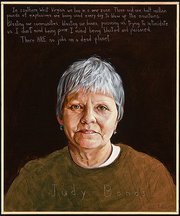We’re mourning the passing of our friend Julia “Judy” Bonds. She was a mother, a grandmother, a coal miner’s daughter, a national leader in the mountaintop removal abolition movement, a director of Coal River Mountain Watch, and a community organizer.
She’d been diagnosed with a very serious case of cancer back in the early summer. On January 3rd 2011, she passed away.
I remember the first time I really spent time with Judy. RAN organized an action at Powershift 2007 with her. At the action, 300 youth and coalfield residents shut down a Washington D.C. Citibank branch (Citibank was a major funder of coal and mountaintop removal at the time.)
You can watch the video below of her and other coalfield residents talking to the branch manager before our march arrived, and see her speaking to youth about being the future and leading our movements for clean water, clean air, clean energy, and an end to mountaintop removal:
I’ve spent the past four years traveling around the eastern parts of the U.S. to actions, marches, conferences, camps and workshops where I often worked with Judy and was proud to call her my friend, hero, comrade, inspiration, and leader.
Her co-director at Coal River Mountain Watch and friend Vernon Haltom remembered her like this:
Judy endured much personal suffering for her leadership. While people of lesser courage would candy-coat their words or simply shut up and sit down, Judy called it as she saw it. She endured physical assault, verbal abuse, and death threats because she stood up for justice for her community.
The last time I saw Judy was last March. We had been at Mountain Justice Spring Break in southwest Virginia, and got up early to support the RAN team who occupied the lawn of the EPA to call for an end to mountaintop removal. We watched the action via livestream, and when I showed Judy the pictures of the action, she was beaming with a big smile and much excitement as the fight to end mountaintop removal had become a national issue and been taken out of the hills and hollers of Appalachia into offices of the power-holders in Washington D.C.
After she’d gotten sick, youth and coalfield residents organized a “thousand hillbilly” march on Washington (also known as Appalachia Rising) that Judy had always dreamed of. While we sat in and awaited arrest in front of the White House, we called her and left messages of love and support. We missed her that day.
Tonight I’m sad and mourning Judy, but also celebrating her life, in part by carrying on her struggle for justice in Appalachia. When they write “The People’s History of the 21st Century,” Judy will be prominently featured in the chapters on mountaintop removal and Appalachia.
I’ll end this essay with more of Vernon’s words:
Judy will be missed by all in this movement, as an icon, a leader, an inspiration, and a friend. No words can ever express what she has meant, and what she will always mean. We will tell stories about her, around fires, in meeting rooms, and any place where people are gathered in the name of justice and love for our fellow human beings. When we prevail, as we must, we will remember Judy as one of the great heroes of our movement. We will always remember her for her passion, conviction, tenacity, and courage, as well as her love of family and friends and her compassion for her fellow human beings. While we grieve, let’s remember what she said, “Fight harder.“

Rest in Peace Judy, we’ll miss and always love you.
